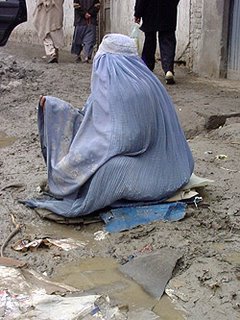
Volgens de propaganda gaat het bergopwaarts met Afghanistan. Volgens de dagelijkse werkelijkheid gaat het bergafwaarts met Afghanistan. De Christian Science Monitor bericht: 'Sixty percent of the respondents had no electricity in their homes. Seven out of 10 Afghan adults have had no more than an elementary education, and half have household incomes of just $500 a year. It doesn't take much of a spark to change public opinion when the fundamental aspects of life - food, shelter, jobs - are in such a precarious state. "What do people want? A clean and accountable government, food on the table, jobs," says Paul Fishstein, director of Afghan Rehabilitation and Evaluation Unit (AREU), a Kabul think tank. When they don't get even those basic amenities, he says, their faith in government declines.
For this reason, Afghan officials are concerned with some of the economic and security measures here:
• Afghanistan's illegal drug economy (mainly opium and heroin) accounted for an estimated $2.7 billion in 2005, according to the UN Office on Drugs and Crime. That's more than 50 percent of the size of the legal gross domestic product.
• Afghan officials estimate that 400,000 farming families benefit from opium poppy cultivation. Many of these participated in alternative livelihood programs last year, but expressed anger at the $2 a day short-term projects like clearing irrigation ditches that offer little stability.
• Afghan officials estimate that there are 50,000 heroin addicts in Afghanistan.
• Between 250,000 and 400,000 civil servants are working within the Afghan government, according to a study by the AREU. (The 150,000 margin of error speaks volumes about government disarray). Afghan officials estimate that perhaps 100,000 of these are directly benefiting (through transportation fees, profits, or bribes) from the drug trade.
• Afghanistan's colleges and universities graduate 38,000 college students each year, and the revitalized primary and secondary school systems in the countryside will see those numbers rise. But nearly 70 percent of the population of Kabul is jobless, and there is almost no job creation to absorb these college graduates.
• Aid groups are working in almost every district, but Afghan officials say that there are 21 provinces (out of 34) where it is unsafe to travel at night, either because of insurgency or crime.
Perhaps most telling is the US State Department's "warden message" in January warning US citizens not to travel to Afghanistan. "The ability of Afghan authorities to maintain order and ensure the security of citizens and visitors is limited.... Travel in all areas of Afghanistan, including the capital Kabul, is unsafe due to military operations, landmines, banditry, armed rivalry among political and tribal groups, and the possibility of terrorist attacks, including attacks using vehicular or other Improvised Explosive Devices (IEDs), and kidnapping."
These problems aren't isolated from each other, say some Afghan officials and foreign observers, who note that the the drug trade is encouraging corruption, corruption is creating public distrust, and public distrust is leading to at least tacit support for insurgency and criminality.' Lees verder: http://search.csmonitor.com/search_content/0214/p01s02-wosc.html




Geen opmerkingen:
Een reactie posten